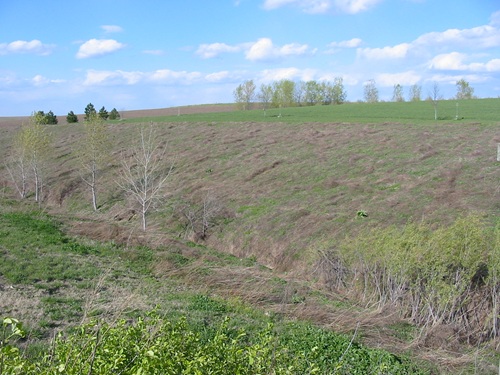Your Rural Code Enforcement Will Work Best When You Explain the Rationale
Published: November 20, 2025
Recently I was asked to give a talk about rural code enforcement. I thought deeply about this assignment and concluded that based on my own experience, and that of the readers of this website, that regardless of the setting, a sound program has the same goal. The purpose should be obtaining compliance with local laws, rather than the too frequent assumption of inspectors that they are part of a system to inflict punishments.

The Purposes Behind Rural Code Enforcement
While I stand by the assessment that the immediate goal of rural code enforcement is obtaining compliance with local law, those local laws themselves have rationales. Most prominent among them are support for safety and health. For example, in terms of safety, we don't want porches or balconies collapsing or a rural home catching on fire because Uncle Ned didn't wire it properly. Local laws also aim to support health through promoting safe drinking water free from groundwater pollution, for example.
Secondly, code enforcement in small towns and rural areas plays a legitimate role in enforcing community standards. An example is limiting what types and quantities of junk may be visible to the public from the road or even neighboring property. The closer the rural community is to a suburb or a city, the stricter the standards are likely to be. As described elsewhere on this site, it is very common for people moving into a rural area to bring expectations of suburban style decorum and free from what they see as the nuisance of farm processes, machinery, noise, and odors. Rural communities enjoying an influx of newcomers face plenty of pressure to enforce their version of community standards. It's a good thing to at least recognize and debate those standards.
Other agendas we have heard, such as raising revenue for the local government or punishing people that the community at large doesn't like, are not worthy motives, in our opinion.
Seven Characteristics of Good Code Enforcement in Small Towns and Rural Environments
This is an opinionated page, based on several years of experience with being in charge of code enforcement or in nearby departments in rural America. Almost all code enforcement these days is what is called complaint-based, meaning either someone from the public complains or the inspector is out driving around and notices a probable code violation. The opposite of complaint-based code enforcement is systematic enforcement, and that means that inspection personnel are proactively looking at every property in a particular area, whether anyone complains or not. Systematic enforcement could be appropriate in a very few rural districts, such as a small town's three-block downtown.
With that explanation out of the way, here is my list of the traits that a good code enforcement program shows.
- First and foremost, it is fair to everyone, whether the program is complaint-based or systematic. This means that economic status, popularity, and of course racial, ethnic, religious, or other profiles are not considered in the slightest. Later in the process, a judge or appeals board may factor in the property owner's ability to pay, but inspectors should be orienting themselves to treating everyone equally.
- There is no regard--none--for political or personal ties of property owner. While this is an expansion on the first point, it is one that needs to be stated explicitly. Rural communities where people are acquainted with almost everyone can be the worst communities in terms of favoritism, so let your inspectors know that county commissioners, mayors, and their siblings are not exempt from complying with the law.
- Except in emergency situations, such as raw sewage leaks maybe, a property owner is given a reasonable amount of time to comply before there is a court date or other escalation of the enforcement activity. What is reasonable may depend on the type of infraction, the local availability of contractors or other professionals needed to correct the situation, weather, and level of expense (such as one that would likely require a loan or other financing).
- Code enforcement officers should not become overly zealous. Examples of common complaints from property owners to this website include officers going into backyards, viewing their property from adjacent properties, and personally throwing away the offending junk. Let your inspectors know that while you stand behind them, this kind of behavior won't be tolerated in a rural setting where word spreads fast.
- Especially in rural situations, I want to see a good program preserving the anonymity of the person making a complaint, to the extent that state sunshine laws allow this. This policy would increase the flow of complaints but take the burden of finding likely code violations away from enforcement officers.
- Code enforcement officers patiently explain the law, and the rationale behind it, when they are questioned and offer ideas about how to comply if and as they have the knowledge or expertise to be helpful. Of course, you will need to elaborate on some guidelines to make sure officers are not incurring a legal liability for your government or themselves when offering advice, so there are limits to this policy.
- If the same violations occur over and over again, and judges are unwilling to hold property owners accountable, code enforcement officials call this situation to the attention of elected officials so that either laws can be modified to be more reasonable, code officials can be told by their elected bosses to relax their attitudes about certain types of situations, or ineffective judges can be replaced.
The Outsized Importance of the "Why" in Rural Areas
While I placed the above list in roughly the order of importance, it's the sixth one that is most relevant to the difference between urban and rural code enforcement. Respecting the rural communication style, much more conversation and explanation is called for if you are in a small town or city, or a predominantly rural county, as compared to cities; in cities, residents are accustomed to the local government making rules and regulations of all kinds, and while they may not love the codes, they can be convinced that there are international code bodies that make up these rules and that they can't do anything about it.
Rural residents want to know why, and even if they don't ask, telling them why only increases the likelihood that the community will accept and sustain a code enforcement program.
Relationship of Local Code Enforcement to State or District Offices
Up until this point, we have been talking about this topic as if the county, township, or city or village government is the only governmental unit involved in rural code enforcement. In most U.S. states, though, and also elsewhere in the world, that is not the case at all.
State governments have health departments and probably environmental departments that are intimately involved in regulating healthy drinking water, proper waste disposal, and myriad other conditions that local code enforcement might be thought by the citizens to be responsible for.
Your local government may decide that it is going to take a back seat and yield completely to state government in many types of enforcement.
However, most likely you are reading this page either because you want to regulate conditions that state law does not address and that regional districts (such as a water management district) do not exist for the purpose you have in mind. That is why it is important to set up your own rural code enforcement philosophy and enforcement system; in almost all states, you may set standards that are stricter than those of the state, and you should do so if your community wants and needs more.
More Relevant Reading for Rural Officials and Leaders
- Community Development >
- Code Enforcement Overview > Rural Code Enforcement
Join GOOD COMMUNITY PLUS, which provides you monthly with short features and tips about timely topics for neighborhoods, towns and cities, community organizations, and rural or small town environments. Unsubscribe any time. We expect to send just one more issue before we abandon this website and move to other projects. Sign up to see our final words of wisdom.




